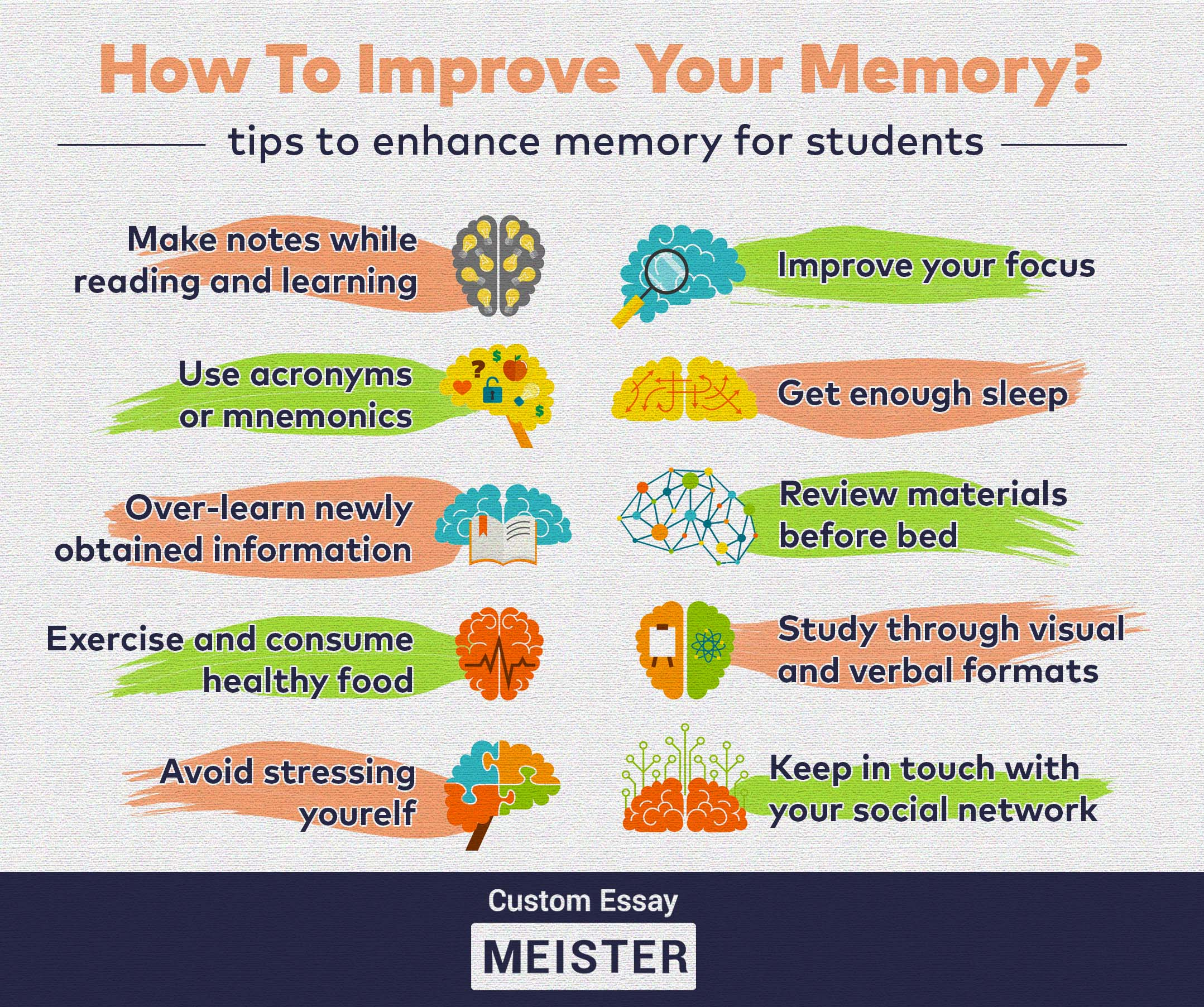Are you looking to improve memory and boost your cognitive abilities? Enhancing your memory isn’t just for students or professionals; it’s a skill everyone can benefit from, whether you’re trying to memorize a grocery list, learn a new language, or perform better at work. By incorporating a variety of memory techniques and brain exercises for memory enhancement, you can significantly sharpen your recall. Simple memory improvement tips, such as regular practice and better sleep hygiene, can align your brain for optimal performance. Explore engaging strategies on how to remember better, enabling you to unlock your mind’s full potential and retain information effortlessly.
Memory enhancement is a vital skill that transcends age and profession, encompassing techniques that can vastly improve how we recall information. Cognitive optimization and mental acuity can be achieved through specific brain exercises designed to strengthen memory pathways. Learning effective methods for better retention can be as beneficial as sharpening focus and clarity in daily tasks. Understanding the underlying principles behind memory formation allows individuals to utilize proven tactics for personal and professional growth. Delving into strategies for cognitive development opens up avenues for lasting improvements in our ability to remember.
Understanding Memory and Its Mechanisms
Memory is a complex cognitive process that enables us to retain and recall experiences, information, and learned skills. It is divided into three main stages: encoding, storage, and retrieval. Encoding refers to how we perceive information, turning sensory input into a form that can be stored. The storage phase is when this information is maintained over time, and retrieval is the process of accessing stored information when needed. To optimize memory functioning, understanding how these stages work is essential, as it allows individuals to apply effective memory techniques during each phase.
Many factors can influence memory retention, including the type of information being learned and the techniques employed during the learning process. For example, engaging multiple senses can enhance memory encoding, making the information more memorable. Furthermore, strategies like chunking—organizing information into meaningful groups—can significantly improve recall abilities. Overall, having a solid understanding of the mechanics of memory can empower individuals to enhance their cognitive abilities and successfully navigate various memory challenges in everyday life.
Recent studies in neuroscience indicate that our memory capacity isn’t fixed; it can be enhanced and improved over time. This flexibility is due to neuroplasticity, where the brain adapts and reshapes itself in response to learning and experience. Researchers emphasize the significance of continuous mental challenges, like brain exercises and memory games, which can stimulate regions of the brain responsible for memory function. Additionally, these activities can also mitigate age-related memory decline, proving that individuals of all ages benefit from engaging memory practices.
By recognizing that memory is a dynamic and trainable skill, we can incorporate various memory improvement tips into our daily lives. This includes adopting healthy habits, like regular exercise and proper sleep, which positively affect cognitive function. With the right knowledge and practices, anyone can learn how to remember better and significantly bolster their memory prowess.
Memory Techniques for Everyday Life
To enhance your recall abilities, incorporating effective memory techniques into your routine is essential. One of the most renowned methods is the ‘method of loci,’ or memory palace technique, where individuals visualize a familiar space and associate specific pieces of information with particular locations within that space. This technique leverages spatial memory and helps in organizing and retrieving complex information. By placing information in a visually rich and structured environment, the brain can more easily tap into those memories when needed.
Another impactful approach involves using mnemonic devices, which are strategies that facilitate the encoding and retrieval of information. For instance, acronyms and rhymes can help solidify memories. To remember lists or sequences, one might create a catchy phrase or rhyme that encapsulates all items. Additionally, utilizing storytelling can also aid memory retention, as narratives can provide a context that makes information more relatable and easier to recall. These memory enhancement techniques can transform even the dullest information into engaging and memorable content.
Practice makes perfect when it comes to memory techniques. Regularly engaging in mental challenges, such as puzzles, memory games, and even quizzes, not only exercises the brain but also fortifies cognitive connections associated with memory. These activities can sharpen recall and improve overall cognitive enhancement, making them a valuable addition to daily routines. It’s essential to commit to continuous practice, as the more one engages with memory-enhancing activities, the better the brain becomes at retrieving information.
Lastly, staying mentally fit is crucial for memory improvement. Just as physical exercise boosts brain health through increased blood flow and the release of growth factors, mental exercises play a pivotal role in maintaining optimal brain function. Combining physical activity with mental challenges creates a strong foundation for improved memory capabilities, making it easier to remember names, facts, or essential tasks in everyday life.
The Impact of Stress on Memory
Stress is an inescapable part of life and can significantly impact memory function. When an individual experiences stress, there is an increase in cortisol levels, which can impair areas of the brain crucial for memory processing, particularly the hippocampus. This dynamic can lead to difficulties with recall, resulting in experiences such as forgetting names or misplacing items. Understanding how stress affects cognitive functions underscores the importance of managing stress through techniques such as mindfulness and relaxation exercises.
Mindfulness practices can help mitigate the adverse effects of stress on memory performance. By focusing on the present moment and reducing anxiety, mindfulness techniques promote better cognitive clarity and memory function. Engaging in activities like meditation, yoga, or breathing exercises can help maintain a calm state, allowing for optimal memory recall during stressful situations. Additionally, knowing when to take a break and allowing the mind to refresh can lead to improvements in memory performance, especially under pressure.
Moreover, developing strong coping strategies against stress is essential for preserving memory capability. This can include time management techniques, prioritizing tasks, and establishing a support system to share challenges with. By addressing the root causes of stress and implementing effective coping mechanisms, individuals can create a more conducive environment for effective memory retention and recall.
In summary, while stress is a natural response, understanding its effects on memory enables individuals to adopt strategies that enhance cognitive functioning. By cultivating a balanced approach to managing stress, integrating relaxation techniques, and remaining mindful, one can significantly improve memory capacity and overall mental agility.
The Role of Sleep in Enhancing Memory
Sleep is an often-underestimated factor that plays a crucial role in improving memory and cognitive performance. During sleep, the brain processes and consolidates information acquired throughout the day, strengthening neuronal connections that facilitate recall. Studies show that getting adequate sleep not only enhances memory retention but also rejuvenates cognitive functions, making it easier to remember crucial information during the day.
Sleep deprivation, in contrast, can lead to cognitive impairments, including difficulties in memory recall, reduced attention span, and slower information processing. Strategies for improving sleep hygiene, such as creating a consistent sleep schedule and optimizing the sleep environment, can significantly benefit memory performance. Prioritizing quality sleep should be a fundamental component of any memory improvement strategy, as it provides a foundation for effective learning and retrieval.
Furthermore, incorporating power naps into daily routines can lead to noticeable enhancements in short-term memory and overall cognitive functioning. Brief periods of sleep throughout the day can revitalize the mind, allowing for heightened focus and improved recall. Therefore, recognizing the importance of sleep in the context of memory enhancement presents an opportunity for individuals to optimize their cognitive performance effectively.
In conclusion, making informed choices about sleep and incorporating good sleep habits can yield impressive benefits for memory enhancement. By understanding the relationship between sleep and memory consolidation, individuals can take proactive steps to ensure they are well-rested and cognitively prepared for the challenges of daily life.
Exercises to Improve Cognitive Function
Engaging in brain exercises is an effective strategy to improve cognitive function and memory capacity. Activities such as puzzles, crosswords, and Sudoku require mental processing, thus stimulating brain activity and enhancing neural connections. Regularly participating in these types of brain games can significantly boost memory abilities, improve problem-solving skills, and even foster creativity.
Another excellent brain exercise is learning a new language or musical instrument, both of which challenge the brain in novel ways. These activities require the brain to adapt and create new pathways, thereby enhancing memory and cognitive flexibility. Moreover, immersing oneself in a new skill not only promotes cognitive enhancement but also helps in maintaining mental sharpness as one ages.
Incorporating regular physical exercise into your routine also significantly benefits brain health. Aerobic exercises, in particular, have been shown to promote blood flow to the brain, which improves overall cognitive function. By combining both mental and physical activities, individuals can create a holistic approach to enhancing memory and overall brain health.
In essence, brain exercises offer a fun and engaging way to improve cognitive function and memory retention. By making these activities a regular part of life, individuals can foster long-term memory improvement and enjoy the benefits of a sharper mind.
Practical Memory Improvement Tips
To remember better in everyday situations, adopting practical memory improvement tips can have a profound impact. One of the simplest yet most effective strategies is to focus on reducing distractions when trying to learn or remember information. Creating a dedicated study environment or workspace free from interruptions allows the mind to concentrate better, significantly enhancing memory retention.
Another valuable tip is to utilize the power of visualization. When trying to memorize information, visualizing it in a vivid and dynamic way can aid retention. By forming mental images of the information you’re trying to retain, you create stronger memory cues that can be more easily accessed later. This technique is particularly useful for visual learners and can turn mundane facts into something far more memorable.
Regularly reviewing learned information is a key strategy for reinforcing memory. Spaced repetition, where you revisit information at increasing intervals, can greatly enhance long-term memory retention. This method allows the brain to encode and store information more efficiently, leading to improved recall over time.
Additionally, engaging with the material by teaching it to someone else can solidify your understanding and retention. This active learning technique requires you to process and verbalize the information, which deepens memory traces in your brain.
Nutrition’s Role in Memory Enhancement
Nutrition plays a critical role in cognitive function and memory enhancement. Consuming a balanced diet rich in antioxidants, healthy fats, vitamins, and minerals is essential for sustaining brain health. Foods that are particularly beneficial for memory include fatty fish, blueberries, nuts, and seeds, which provide the essential nutrients that support cognitive strength and resilience.
Additionally, maintaining proper hydration is crucial for optimal brain function. Dehydration can lead to cognitive decline and memory lapses, so ensuring that you drink enough water throughout the day can directly affect memory retention and clarity. Incorporating hydration habits into daily routines can lead to noticeable improvements in memory performance.
Furthermore, certain nutrients like omega-3 fatty acids have been shown to promote brain health, supporting the growth of new brain cells and enhancing cognitive functions. A diet enriched with these beneficial nutrients can not only aid memory improvement but also play a significant role in protecting against age-related cognitive decline.
In summary, the relationship between nutrition and memory is well established. By recognizing the powerful impact that diet has on cognitive function, individuals can make informed choices that promote better memory retention and overall brain health.
Overcoming Memory Challenges
Overcoming memory challenges requires a multifaceted approach that includes self-awareness, effective strategies, and consistent practice. As individuals face day-to-day memory struggles, such as forgetting names or appointments, assessing the underlying factors—like stress or lack of sleep—can provide insight into personal memory challenges. By identifying these issues, individuals can take proactive steps to address them.
Implementing techniques like establishing routines, using organizing tools (like calendars and reminder apps), and setting specific goals can significantly minimize forgetfulness. Furthermore, brainstorming ways to create associations between new and existing knowledge can lead to stronger memory connections. Consistency in these practices is vital; regular engagement with memory improvement strategies fosters long-term success.
Finally, it’s important to recognize and embrace the idea that memory can improve over time with commitment and effort. Seeking external resources, like memory improvement workshops, literature like Budson and Kensinger’s book, and support from peers or professionals can serve as motivators in overcoming memory challenges.
In essence, while memory challenges can be daunting, a proactive approach focusing on self-awareness, structured strategies, and community support can effectively enhance memory capabilities and foster greater confidence in one’s cognitive abilities.
Frequently Asked Questions
What are some effective memory techniques to improve memory retention?
Effective memory techniques include using mnemonic devices, practicing spaced repetition, and utilizing the method of loci, or memory palace concept. These strategies help to enhance memory retention by creating associations and organizing information in meaningful ways.
How can I remember better using memory improvement tips?
To remember better, integrate memory improvement tips such as visualizing concepts, chunking information into smaller groups, and regularly testing yourself on the material. Consistent practice and applying these tips daily can lead to significant enhancements in memory.
What brain exercises for memory can I do at home?
Brain exercises for memory that you can do at home include puzzles like Sudoku or crosswords, memory games that challenge your recall, and engaging in activities that require you to memorize new information, such as learning a new language or instrument.
What lifestyle changes can help improve memory and cognitive enhancement?
Lifestyle changes that boost memory and cognitive enhancement include regular physical exercise, a balanced diet rich in antioxidants and omega-3 fatty acids, adequate sleep, and practicing mindfulness or meditation to reduce stress, which can impair memory.
How does sleep help improve memory?
Sleep significantly improves memory by consolidating and organizing information. During sleep, particularly during REM cycles, the brain strengthens neural connections related to learned material, helping you recall information more effectively.
Can multitasking affect memory when trying to learn new things?
Yes, multitasking can negatively impact memory when learning new information. Focusing on a single task enhances concentration and memory retention, while divided attention can lead to shallow processing and forgetting.
What is the role of nutrition in memory improvement?
Nutrition plays a crucial role in memory improvement; foods high in antioxidants, healthy fats, vitamins, and minerals can enhance brain function. Nutrients such as omega-3 fatty acids, found in fish, and flavonoids, found in fruits, support cognitive health and memory.
What are some common memory improvement tips for students?
Common memory improvement tips for students include organizing study materials, breaking information into manageable parts, taking regular study breaks, and using creative techniques like visualization and storytelling to make information memorable.
How does stress affect memory and recall?
Stress can significantly impact memory and recall abilities. While acute stress may enhance focus momentarily, chronic stress can lead to difficulties in forming new memories and retrieving existing ones, ultimately impairing cognitive function.
What is the method of loci and how can it help improve memory?
The method of loci, also known as the memory palace technique, involves visualizing a familiar place and associating the information you want to remember with specific locations within that space. This technique helps organize and retrieve information more efficiently, enhancing overall memory.
| Key Point | Description |
|---|---|
| Memory and Recall | Understanding how memory works can help improve recall during critical moments. |
| Practice Techniques | Regular practice is more effective than cramming. Daily practice aids in mastering skills. |
| Physical Exercise | Exercising can enhance brain function and memory by increasing brain volume and releasing growth factors. |
| Memory Retrieval | Retrieving memories can alter them. Understanding this can help optimize recall. |
| Effects of Multitasking | Multitasking degrades memory. Focusing on one task at a time enhances performance. |
| Sleep for Memory | Sleeping after studying can enhance memory retention and clear confusion. |
| Memory Techniques | Techniques such as the ‘memory palace’ can significantly improve recall. |
| Cognitive Impact of Stress | Stress can trigger a memory recall boost, but chronic stress can harm memory. |
Summary
Improve memory with the right strategies and techniques. By understanding how memory works and applying research-backed methods like the memory palace or regular practice, you can significantly enhance your ability to recall information. Investing time in techniques such as managing stress and ensuring quality sleep can also contribute to better memory retention. Remember, improving your memory is not just beneficial for academics, but it also plays a vital role in everyday interactions and productivity.



